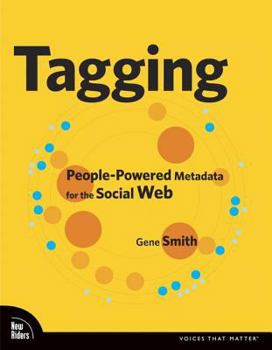Tagging: People-Powered Metadata for the Social Web
Tagging is fast becoming one of the primary ways people organize and manage digital information. Tagging complements traditional organizational tools like folders and search on users desktops as well... This description may be from another edition of this product.
Format:Paperback
Language:English
ISBN:0321529170
ISBN13:9780321529176
Release Date:December 2007
Publisher:New Riders Publishing
Length:208 Pages
Weight:0.82 lbs.
Dimensions:0.4" x 7.1" x 9.0"
Customer Reviews
4 ratings
Exceptional book
Published by Thriftbooks.com User , 15 years ago
I have worked on a variety of applications and have participated in conferences where it is clear we all have an incredible amount of data to manage. It seems tagging is the new means of organizing your data, but it is also equally clear to most of us that this feels very unstructured. This book is sure to be a seminal book, discussing the early years of tagging. It deals with the basics: a. What it is b. Why we want to do it c. Some various methods and structures for tagging and how we would use it. d. Examples of the components of tagging, why and where to use them e. Some code nuts and bolts of how to approach tagging. Finally there are some real life examples 1. Social bookmarking 2. Media sharing 3. Personal information management. This book is easy to read and quickly gets you up to speed on some of the issues associated with tagging. Essentially it says, you need to decide what you want to do, before deciding on the type of tagging you would use. It also clearly leaves the reader realizing this is just the beginning..
The new metadata science
Published by Thriftbooks.com User , 16 years ago
I think that this book creates a new specialization in the science of metadata and controlled vocabularies: tagging. The book is very well wrote and contains very well illustrations and diagrams. But the most important of all is that this book explains and illustrates the emerging of a new information science discipline: tagging, or, as the author says "people-powered metadata".
Tagging helps create community
Published by Thriftbooks.com User , 16 years ago
Participating in a community, sharing our interests, and contributing to the collective good are all fundamentally human motivations, Smith says, and social tagging systems tap into these. If you use the Web a lot, the stream of information you navigate sometimes seems like a tsunami. Besides emails and RSS feeds, your digital stream can include social networking sites, photos from your friends, links from Del.icio.us, and Twitter tweets. Tagging these online resources can help you make sense of your stream. If you use tags now, this book will show you ways to juice your game, and will likely point you to new resources. If you don't use tags, this book explains how tagging can help, and how to get started. And if you're a web architect, Gene Smith walks you through the things you should consider when designing tagging system.
Great Strategic Principles and Tactical Examples
Published by Thriftbooks.com User , 16 years ago
I appreciated how well thought out this book was in its presentation. It's a very useful book with real world examples. However, it is more than that because it also outlines useful principles to think about, consider and make choice about when considering how to use Tagging.





